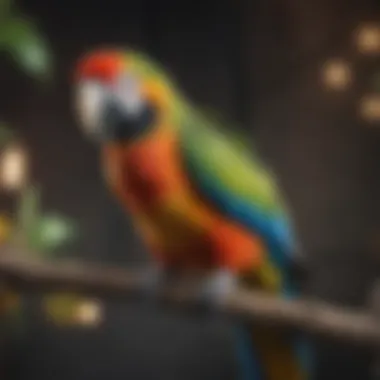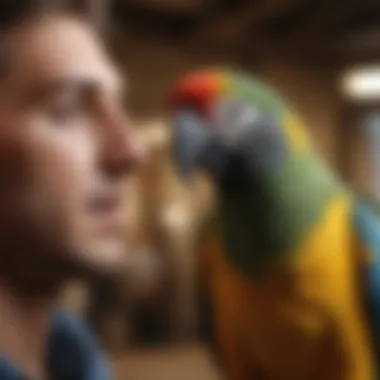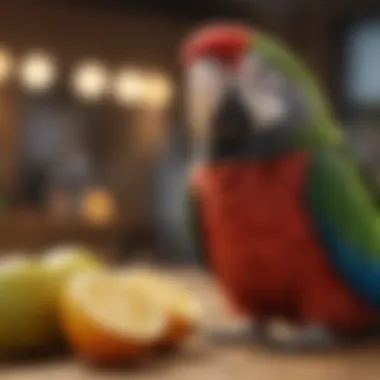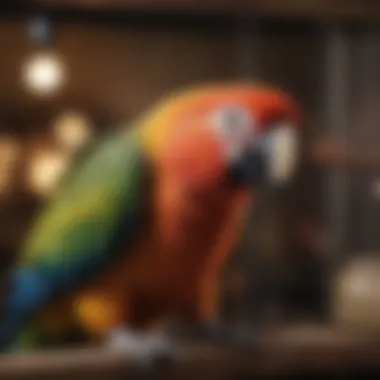Top Parrots for Beginners: Essential Care Guide


Intro
Choosing a parrot as a pet can be a rewarding experience. For beginners, this journey begins with understanding which species are suitable for novice owners. This guide aims to provide insights into the traits and requirements of various parrot species, along with essential care practices. By knowing more about these birds, potential owners can make informed decisions, ensuring a lasting bond with their feathered friends.
Grooming Techniques
Grooming plays a vital role in the health and well-being of parrots. Regular grooming helps maintain their feathers and skin in optimal condition. It also strengthens the relationship between the bird and its owner.
Basic Grooming Tools
Having the right tools is essential for effective parrot grooming. Common tools include:
- Bird-safe nail clippers: Helps prevent overgrown nails, ensuring comfort for the bird.
- Feather dusters or brushes: Use these to remove loose feathers and dirt.
- Bird wipes: Gentle cleaning aids for quick fixes.
- Calcium cuttlefish bone: Offers a natural way to keep beaks healthy and trim.
Step-by-Step Grooming Guides
- Nail Trimming: Gently hold your parrot's foot and trim the nail tips, being careful not to cut into the quick.
- Feather Maintenance: Use a soft brush to gently stroke the feathers downwards, removing any loose debris.
- Beak Care: Provide chew toys made of safe materials to naturally wear down the beak.
Breed-Specific Grooming Needs
Different breeds may have unique grooming needs. For example, Cockatiels often require more frequent feather checks due to their soft plumage. Budgerigars, common companions, usually need simple nail trims and occasional baths.
Health and Wellness
The health of your parrot is paramount. Prioritizing care and understanding their needs is crucial for a happy pet.
Nutrition and Diet Tips
A balanced diet ensures robust health. An ideal diet includes:
- High-quality pellets: Formulated specifically for parrots.
- Fresh fruits and vegetables: Such as apples, carrots, and spinach.
- Occasional seeds: As treats, not staples.
Common Health Issues and Solutions
Some common health issues include:
- Feather plucking: Can indicate stress. Provide environmental enrichment or consult a vet.
- Respiratory infections: Observe for wheezing; seek timely veterinary advice.
Importance of Regular Check-Ups
Regular vet visits help catch issues early. Schedule check-ups at least once a year for a thorough health assessment. This proactive measure supports your bird's longevity.
Training and Behavior
Training your parrot is essential for a harmonious relationship. It can enhance communication and reduce behavioral problems.
Basic Training Commands
Start with simple commands:
- Step up: Taught to encourage the bird to step onto your hand.
- Come down: Assists in getting the bird back safely to its cage.
Understanding Common Behavioral Issues
Understanding behaviors can help manage your parrot. Some frequent issues include:
- Screaming: Often a call for attention or boredom.
- Biting: Might be a response to fear or discomfort; handle gently.
Techniques for Effective Training
Positive reinforcement is key. Reward good behavior with treats or praise. Be consistent with commands, and practice regularly to encourage learning.
Product Reviews
Finding the right products can enhance the care for your parrot. The right tools for grooming, health, and training matter significantly.


Comparison of Grooming Tools
When selecting grooming tools, consider their quality and safety for your bird. Research different brands, ensuring they are designed for avian care.
Best Pet Products for Health
Invest in nutritious pellets and quality toys. Brands like Kaytee and Zupreem offer reputable products for parrots. These investments result in a healthier, happier bird.
Review of Training Aids
Training aids like the Parrot Training Kit can provide structured learning for your bird. Look for items that promote interaction and engagement.
Community Insights
Learning from other parrot owners enhances your experience. The online community can be a valuable resource for insights and support.
User-Submitted Tips and Tricks
Engaging in forums on platforms like Reddit can offer practical advice based on personal experiences. Many owners share strategies for care and training.
Real-Life Grooming Experiences
Sharing grooming stories can be beneficial. For example, an owner might recount their challenges with nail trimming and how they overcame them.
Expert Guest Contributions
Inviting avian veterinarians or behaviorists to contribute can provide accurate, reliable information. Expert advice clarifies any uncertainties for new owners.
Understanding the unique needs of your parrot species can enhance your ownership experience significantly.
Prolusion to Parrots as Pets
Parrots present unique companionship for many. They are intelligent, lively, and often form strong bonds with their owners. However, becoming a parrot owner is not only a choice but a commitment that demands careful thought. It’s crucial to understand what it means to have a parrot as a pet before making this decision. The goal of this section is to lay the groundwork for this journey by addressing the fundamental aspects that prospective owners should consider.
Understanding Parrots
Parrots belong to a diverse group of birds, which includes over 393 species. They range in size, color, and personality, making them fascinating pets. Known for their vibrant plumage and charismatic behavior, parrots can interact with humans in remarkable ways. Their ability to mimic sounds and human speech adds to their appeal. However, their social and cognitive needs are equally important. Owning a parrot requires an understanding of their behaviors and the environment they thrive in.
A parrot’s natural habitat significantly influences its needs. In the wild, parrots are highly social creatures. They live in flocks and spend much of their time exploring, playing, and engaging with their companions. Thus, companionship is vital to a parrot’s well-being. A solitary parrot may exhibit stress-related behaviors, such as excessive screaming or feather plucking, which can lead to further issues such as health problems.
Importance of Choosing the Right Species
Selecting the right parrot species is pivotal for both the owner and the bird. Each species comes with its own set of requirements, personality traits, and biological needs. For beginners, it’s wise to consider species that are more manageable in terms of care and interaction.
Choosing the right species means considering factors like size, vocal tendencies, and social needs. Some species like the Budgerigar are smaller and relatively easy to care for, while larger species may present more challenges. Each parrot has its unique character; understanding these traits before adoption can prevent challenges down the line.
It is also important to evaluate the environment you can offer. A species that thrives in a busy household may not be suitable for a quieter setting. Researching the temperaments and specific requirements of various species is essential to ensure a harmonious relationship between parrot and owner.
Understanding the unique traits of parrot species is crucial for a successful pet ownership experience.
The right match can lead to a fulfilling relationship, contributing positively to the lives of both pet and owner. Investing time in research now will pay off later, ensuring both happiness and health.
Factors to Consider Before Adoption
Before welcoming a parrot into your home, it is essential to assess several critical factors. Owning a pet parrot is a significant commitment. Each aspect of care can directly impact the bird's well-being and your experience as an owner. Consideration of these elements can lead you to make a more informed choice.
Time Commitment
Owning a parrot is not just about feeding and cleaning. These birds require regular interaction to thrive. Some species may even demand several hours of attention per day. For example, social birds like Cockatiels require daily mental stimulation.
If you work long hours or travel often, a parrot may not be the best option for you. Establish a routine before adopting. This includes time for bonding, play, and training. The more engaged you are, the more your parrot will blossom in their new environment.
Space Requirements
Parrots need adequate space for their movement and well-being. A small cage can limit their freedom and impact their happiness. The size of the cage should correspond to the size of the bird and their activity level. For instance, larger birds like African Greys need larger cages compared to small budgerigars.


It's equally important to consider the area outside the cage. Parrots should have moments outside their cage to explore in a safe environment. Therefore, assess your living space to ensure there is enough room for a suitable cage and safe play areas.
Financial Considerations
The cost of adopting a parrot goes beyond the initial purchase price. Regular expenses include food, medical care, and toys. High-quality pellets and fresh vegetables can create a proper diet, but this may be pricier than you expect. Routine veterinary check-ups are essential for monitoring their health. Any unexpected medical expenses could add considerable costs.
Choose wisely, as the financial responsibility can quickly add up. Thorough budgeting will give you a clearer picture of the long-term commitment involved in being a parrot owner. It is wise to consider whether you can consistently provide the necessary resources.
Owning a parrot is a long-term commitment that requires careful consideration of time, space, and finances. Each factor contributes to a parrot’s happiness and well-being. Assessing your situation before adopting can make a significant difference in both your life and the bird's.
Thinking ahead can help ensure a fulfilling and harmonious life with your future parrot.
Top Parrot Species for Beginners
Choosing the right parrot species is a crucial step for those considering welcoming one into their home. This section identifies parrot species that are suitable for novice owners based on their physical traits, temperament, and care needs. Understanding the characteristics of these birds can help prospective pet owners make an informed choice, ensuring a positive experience for both the bird and human.
Budgerigar (Budgie)
Physical Characteristics
Budgerigars, commonly known as budgies, are small parrots that typically grow to about 7 inches in length. Their vibrant colors come in a range of shades, such as green, yellow, and blue. What makes the budgie an appealing choice is its small size and ability to adapt to various living situations. Their petite stature makes them easy to manage within limited space, which is often a consideration for beginner pet owners. This trait is particularly beneficial for apartment dwellers where larger birds are not feasible.
Social Nature
Budgies are known for their sociable behavior. These birds thrive on interaction and often require companionship, either from humans or fellow budgies. Their friendly disposition often leads to vocal mimicry, making them engaging companions. This social nature fosters a bond between pet and owner, which is essential in any pet relationship. Such characteristics are appealing as they promote an enriched environment which can reduce stress for both the owner and the budgie.
Care Requirements
Caring for budgies is relatively straightforward, providing a good starting point for novice owners. Their diets primarily consist of seeds, fruits, and vegetables, requiring minimal special knowledge to maintain their health. Regular cage cleaning and periodic social interaction are essential in their care. Budgies tend to be forgiving and adaptable, which allows new owners to learn as they go. This manageable care schedule makes them an accessible choice for anyone looking to adopt a pet bird.
Cockatiel
Distinctive Features
Cockatiels are larger than budgies, typically measuring around 12 to 14 inches in length. Notably, they have distinctive crests and vibrant cheek patches. Their physical presence and beauty make them capture attention quickly. This engaging appearance adds to their popularity among beginner parrot owners. A more significant size means a larger cage requirement, but their ease of care compensates for this aspect.
Temperament
Known for their amiable temperament, cockatiels tend to be gentle and affectionate. They can develop strong bonds with their owners, often displaying affectionate behaviors. This makes them a rewarding choice for beginner owners, as they offer companionship and a sense of emotional connection. However, their gentle demeanor does require that they be handled carefully, as they can be susceptible to stress in chaotic environments.
Nutritional Needs
Proper nutrition is vital for maintaining the health of cockatiels. A balanced diet typically includes seed mixes, pellets, and fresh fruits and vegetables. The importance of varied nutrition cannot be overstressed, as it plays a significant role in preventing health issues. The need for dedicated attention to dietary richness encourages beginners to engage actively in their pet’s care, making the learning experience all the more rewarding.
Lovebird
Color Varieties
Lovebirds come in a variety of colors, including peach, green, and yellow. These color choices significantly contribute to their appeal. The visual diversity allows owners to personalize their experience by selecting a bird that resonates with their aesthetic preferences. This variety is not only about looks but can also reflect the species' mood and health, engaging beginners in basic avian care knowledge.
Social Behavior
Lovebirds are referred to as
Basic Care Guidelines
Understanding the basic care guidelines for parrots is crucial for any beginner. This includes several essential aspects that contribute to the well-being of these birds. By adhering to these guidelines, new pet owners can ensure their parrots thrive in a safe and nurturing environment. These guidelines cover dietary needs, cage setups, and socialization strategies, all of which play a significant role in fostering a suitable habitat for your feathered friend.
Dietary Needs
Essential Nutrients
A balanced diet is paramount for the health of parrots. Essential nutrients such as vitamins, minerals, and proteins are critical for their growth and overall well-being. Parrots require a variety of nutrients to maintain a healthy plumage, strong bones, and a robust immune system. Bird owners should prioritize fresh fruits, vegetables, and high-quality pellets as the primary components of their parrots’ diet. The most significant characteristic of essential nutrients is their role in preventing malnutrition, which is a frequent issue in pet birds. When parrots receive appropriate nutrients, they exhibit vibrant energy levels and engage in normal social interactions, further enriching their lives.
Recommended Food Types


Choosing suitable food types can be daunting for beginners. A good diet includes a mix of high-quality pellets, fresh fruits, and vegetables. Pellets, in particular, are designed to provide a comprehensive nutrient profile, ensuring that birds receive what they need. These offer a significant advantage as they are often formulated specifically for parrot species. However, it is essential to introduce new foods gradually to avoid digestive issues. An important feature of recommended food types is their ease of use, as they simplify feeding routines for new parrot owners.
Cage Setup
Size Recommendations
Choosing the right size for a parrot cage is vital, as it directly impacts the bird's quality of life. Generally, larger cages provide more space for movement, exploration, and exercise. Size recommendations depend on the species of parrot, but the rule of thumb is to select the largest cage possible. A larger cage can minimize stress and behavioral issues in parrots. Additionally, well-sized cages often include more opportunities for enrichment activities, such as climbing and playing.
Essential Accessories
Your parrot's cage should not only be spacious but also equipped with essential accessories. Commonly, these include perches, toys, and water dishes. Perches should vary in size and texture to prevent foot problems. Toys, on the other hand, play a crucial role in mental stimulation and can help reduce boredom-related behaviors. Essential accessories significantly enhance the living environment for parrots, providing necessary comfort and enriching their daily activities. Without these components, the risk of behavioral issues rises among pet birds.
Socialization and Interaction
Importance of Bonding
Bonding with your parrot is fundamental for establishing a trusting relationship. When parrots feel secure with their owners, they are likely to display affection and engage in interactive behaviors. This bond is built over time through consistent positive interactions. Importance of bonding cannot be understated, as it affects a parrot’s emotional health. A well-bonded parrot tends to be more confident and social, enhancing its overall quality of life.
Playtime Activities
Engaging parrots in regular playtime activities is beneficial for both their physical health and emotional well-being. Playtime can include interactive toys, climbing structures, or supervised out-of-cage time. These activities stimulate their minds and prevent common issues like feather plucking or destructive behaviors. The characteristic of playtime activities lies in their ability to foster interaction and bonding between owner and bird. Creating a routine playtime not only enriches the parrot's life but also reinforces the human-animal connection.
Remember, a well-cared-for parrot can become a lifelong companion, enriching your life with companionship and joy.
Common Health Issues in Parrots
Understanding the common health issues in parrots is crucial for every potential owner. Parrots are vibrant, intelligent creatures, but they come with their own set of health challenges that require awareness and proactive care. As a beginner, being equipped with this knowledge can enhance the quality of life for both you and your feathered friend. Recognizing signs of illness and implementing preventive care are foundational aspects of parrot ownership. Doing so will help in fostering a healthy, and long-lasting relationship with your pet.
Signs of Illness
Identifying signs of illness in parrots can often be a challenge. Their behaviors can change subtly, making it important for owners to be observant. Common signs to look out for include:
- Change in Appetite: If your parrot is eating less or completely stops eating, it's a major concern.
- Lethargy: A decrease in energy or enthusiasm can indicate health issues.
- Feather Condition: Dull, ruffled, or missing feathers may suggest nutritional deficiencies or parasites.
- Change in Vocalization: A sudden change in the frequency or quality of your parrot's sounds can be a red flag.
- Behavioral Changes: Increased aggression or excessive hiding can signal stress or illness.
Regular monitoring can help catch these symptoms early. Prompt action can prevent small issues from escalating into major problems.
Preventive Care
Prevention is better than cure, especially when it comes to parrot health. Here are some preventive care measures to implement:
- Regular Health Check-Ups: Scheduling visits to an avian veterinarian ensures that your parrot is in optimal health, much like you would for a dog or a cat.
- Proper Diet: A balanced diet is key. Ensure that your parrot receives a variety of seeds, pellets, fruits, and vegetables to meet all nutritional needs.
- Clean Environment: A clean cage helps prevent infections. Regularly clean the cage, toys, and food dishes to eliminate bacteria or parasites.
- Social Interaction: Parrots are social animals. Providing them with interaction prevents mental health issues, which can manifest physically.
Implementing these practices fosters a stable environment. It boosts the overall well-being of your parrot.
When to See a Veterinarian
Knowing when to consult a veterinarian is vital for parrot owners. Here are some guidelines to determine when a visit is necessary:
- Persistent Symptoms: If any signs of illness are noticed that last more than a day.
- Significant Weight Loss: Monitor your parrot's weight regularly. A sharp decline is a cause for concern.
- Severe Behavioral Changes: Extreme lethargy or aggressive behavior that occurs suddenly should prompt an immediate vet visit.
- Vomiting or Diarrhea: Any gastrointestinal disturbances can lead to dehydration and may require medical attention.
Important: Always trust your instincts. If you believe something is wrong, it's better to err on the side of caution and seek professional advice.
Ending and Final Thoughts
In this comprehensive guide about beginner parrots, the final thoughts and conclusions serve several crucial purposes. Understanding these aspects can greatly influence how successful and enjoyable the experience of keeping a parrot can be. The commitment to adopt a parrot extends beyond mere ownership; it embodies a lifelong responsibility and dedication to fostering a healthy and happy environment for the pet.
Long-term Commitment
Adopting a parrot is not a spur-of-the-moment decision. Potential owners must recognize that parrots often live for many years, some reaching up to 30 years or more. This longevity requires a long-term commitment regarding care, attention, and resources. Parrots need daily interaction, mental stimulation, and socialization. Owners must be prepared to accommodate their feathered companions in every aspect of life, considering how travel, work, and lifestyle changes can impact the well-being of their birds.
Moreover, regular veterinary check-ups are vital to keep a parrot healthy. This includes vaccinations and screenings for common health issues. Financial planning should also consider these aspects, as the ongoing costs can accumulate over the years. Thus, a clear understanding of the long-term commitment involved is essential for prospective parrot owners.
Building a Lasting Relationship
To build a lasting relationship with a parrot, owners should engage in activities that promote trust and affection. Social behaviors are critical; thus, spending time with the bird daily is necessary to foster a bond that thrives on companionship. Simple routines like talking, playing, and sharing space can be beneficial.
Establishing a predictable environment helps parrots feel secure. Consistency in their schedule, such as feeding and playtime, strengthens the relationship further. Training is equally important, as it not only reinforces desired behaviors but also creates opportunities for interaction.
Positive reinforcement through treats and praise makes the learning process enjoyable for both owner and parrot. Building a deep connection involves patience and respect for the bird’s needs. Over time, this mutual understanding leads to a rewarding partnership.
Every parrot is unique, requiring personalized attention and care tailored to its character and needs.







